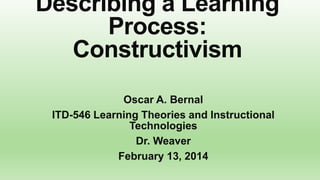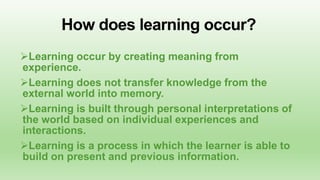Module 3 assignment: Describing a Learning Process
- 1. Describing a Learning Process: Constructivism Oscar A. Bernal ITD-546 Learning Theories and Instructional Technologies Dr. Weaver February 13, 2014
- 2. Constructivism Defined A new learning theory that attempts to explain how adult learners learn by constructing knowledge for themselves. A synthesis of multiple theories diffused into one form. The assimilation of both behaviorialist and cognitive ideals. “Learning is a process of constructing meaning; it is how people make sense of their experience” (Merriam
- 3. How does learning occur? Learning occur by creating meaning from experience. Learning does not transfer knowledge from the external world into memory. Learning is built through personal interpretations of the world based on individual experiences and interactions. Learning is a process in which the learner is able to build on present and previous information.
- 4. Which factors influence learning? Learning occurs when there is interaction between the learner and the environment. Content knowledge must be embedded in the situation in which it is used. Learning is based on the interpretation of a current event as it relates to its history of previous interactions. Learning is constantly changing as concepts continually evolve with each new use. Learning occur in realistic settings. Learning tasks must be relevant to the student’s lived experience.
- 5. What is the role of memory? Learning particular facts is not important, what is important is to elaborate on and interpret information. Memory is always under construction as a cumulative history of interactions. Information is not stored in memory as a single piece of knowledge. Memory is used to understand a specific situation based on prior knowledge from different sources related with the problem at hand. Learning must include activity, concept and culture to be successful, meaningful, and lasting.
- 6. How does transfer occur? By being involved in unique tasks hold in place by meaningful contexts. The learning experience has to be authentic to be meaningful to the learner’s ability to use ideas. Learning always takes place in a context always linked with the knowledge link in it. Learning is decontextualized Learning is measured on the effectiveness of facilitating thinking.
- 7. What types of learning are best explained by this position? There is no specific type of learning independent from content and context of learning. It is impossible to isolate units of information. There is no hierarchical analysis of relationships with regards to the division of knowledge domains. Much of what needs to be learned involves advanced knowledge in ill-structured domains. Learning environments are most effective for the stage of advanced knowledge acquition.
- 8. References Ertmer, P. A., & Newby, T. J., (1993). Behaviorism, cognitivism, constructivism: critical features from an instructional design perspective. Performance Improvement Quarterly, 6(4), 50- 72. Wikibooks. (2006). Learning Theories. http://en.wikibooksorg/wiki/Learning_Theories.








